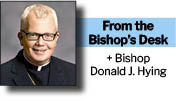
On April 2, 2024, the Dicastery for the Doctrine of the Faith issued Dignitas Infinita, a document which powerfully articulates the dignity of the human person as an integral and foundational component of Catholic, belief, thought, and practice, and then proceeds to outline some of the perennial and current threats to human dignity.
Christian anthropology expresses a profound understanding of the human person, made in the image and likeness of God, and redeemed by Jesus Christ, who in assuming our nature, gave it an even greater dignity and significance. Possessing an imperishable spirit, destined for eternal union with God, every human being has an absolute dignity, which must be respected and nurtured within the family, society at large, and the Church.
“From this truth, the Church draws her reasons for her commitment to the weak and those less endowed with power, always insisting on ‘the primacy of the human person and the defense of his or her dignity beyond every circumstance.’” (#1) Throughout history and throughout the world, so much suffering flows from a flawed understanding of the human person and consequent violations of each individual’s dignity.
Fundamental violations of human dignity
Dignitas Infinita lists some of those fundamental violations, beginning with poverty. Despite a marked increase in the world’s collective wealth, the vast majority of global resources remain in relatively few hands.
While poverty has thankfully decreased in some areas, millions of people still endure a harsh existence, lacking adequate food, water, shelter, employment, education, freedom, and peace. War, evil governments, climate disasters, and flawed economies account for much of this human misery.
My heart is always with the crucified people of Haiti and the millions in Africa who suffer drought and civil war.
Despite all of our technological and material advances, poverty still haunts many of our brothers and sisters. I am grateful for the millions of Catholics who sacrificially strive to change these desperate situations of hopelessness and despair. How much suffering and evil flow from the scourge of war.
The Church has clearly laid out the principles which could justify war in certain circumstances, but most wars do not fall into this category.
Sadly pondering the current wars in Ukraine and Gaza, recounting the disturbing explosion of terrorism and violence everywhere, we must rededicate ourselves to peace and reconciliation. We must also acknowledge that not every culture or people inculcates respect for human dignity, fraternal charity, forgiveness, and tolerance of legitimate differences.
As stated before, flawed anthropologies lead to violence and evil. So much migration flows from these terrible situations of poverty and war, as people flee such hopeless circumstances.
The document condemns human trafficking, sexual abuse, violence against women, and the marginalization of persons with disabilities.
These sins against the human person remind us that no individual is a thing, a commodity, a means to an end, or simply a cog in a political or economic machine. Human dignity does not equate with economic productivity, material usefulness, or worldly value.
As debates concerning abortion continue to roil our country, the Church here reaffirms her fundamental support of the absolute value and dignity of human life, beginning from the moment of conception.
As has been pointed out by many saints and popes, as well as our own Declaration of Independence, the right to life is the cornerstone of every other human right, “the inalienable prerequisite for the protection of a personal and social existence”. (#47)
Through many efforts, the Church seeks to support women and men who find themselves in crisis pregnancies and challenging parenthood. Abortion is a grave violation of God’s law and the fundamental dignity of the person, and can never be justified. Surrogacy, euthanasia, and assisted suicide speak to the human manipulation of the gift of life, both at its beginning and its end.
As the Author of Life, God brings life into being and determines the natural course of its earthly end. The above actions are sinful for they take this divine power over life and death into human hands, rejecting the natural law, placed by God in every heart.
Dignitatis Infinita also criticizes gender theory and sex change.
While supporting those who suffer gender dysphoria, the current societal trend to unconditionally affirm psychological and physical sexual redefinition does grave violence to the human person in his or her bodily integrity.
The medical community’s support of the sexual mutilation of children is particularly disturbing. Many persons who have sought such sexual redefinition have not found the peace and happiness which they were seeking.
Human dignity within the Church
The Church truly loves every person, created by God in His sacred image, and seeks to help them live out the gift and mystery of their graced existence.
“Respect for both one’s own body and that of others is crucial in light of the proliferation of claims to new rights advanced by gender theory.” (#59)
As you can see, this new document proclaims the Gospel of Life, with the dignity of the human person as the cornerstone of the Church’s message and presence in the world.
The Catholic Church provides more education, health care, economic and social development, and relief from poverty and suffering than any other institution on the planet. She does so as the servant of the human person, created by the Father, redeemed by Christ, and sanctified in the Holy Spirit.
To uphold the absolute value of every human person against every diminishment of that value is to proclaim the Good News of Jesus Christ, both in word and deed.

